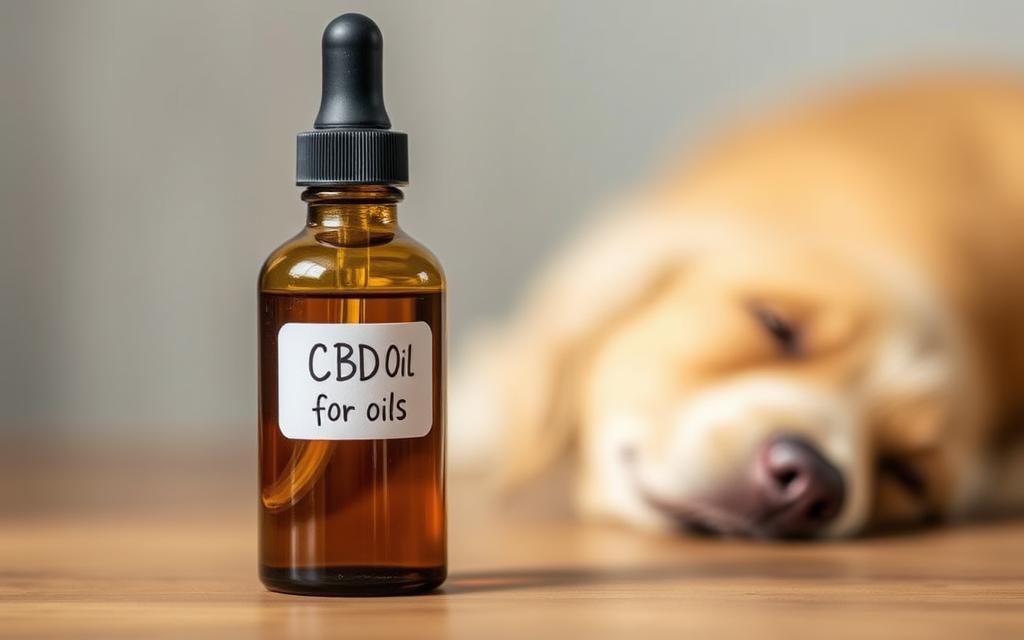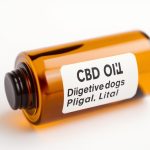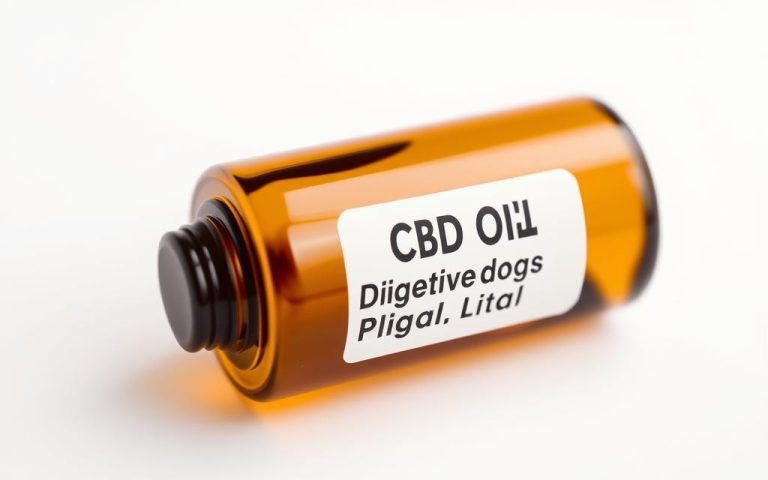Giving Your Dog CBD Oil for Pain: Benefits and Risks Explained
Many pet owners are exploring alternative treatments for their furry companions. One option gaining attention is hemp-derived products. These items are non-psychoactive and THC-free, making them a potential choice for managing discomfort.
Dr. Jerry Klein, the AKC Chief Veterinarian, emphasizes the importance of understanding these products. Recent studies, like the 2024 Cornell University research, show promising results. For example, 80% of dogs with osteoarthritis experienced reduced discomfort.
However, ongoing research at Colorado State University highlights the need for caution. While benefits exist, potential risks must be considered. Always consult a veterinarian before starting any new treatment for your pet.
This article provides a balanced analysis of the science, dosage guidelines, and product selection criteria. Stay informed to make the best decisions for your furry friend.
What Is CBD Oil and How Does It Work for Dogs?
Exploring the science behind CBD oil can help pet owners make informed decisions. Derived from the hemp plant, CBD is a non-intoxicating compound that interacts with the body’s endocannabinoid system. This system plays a crucial role in maintaining balance and supporting overall health.
The endocannabinoid system includes receptors found throughout the nervous system. When CBD interacts with these receptors, it may help regulate functions like pain perception and inflammation. Dogs process cannabinoids faster than humans, making it essential to choose the right dosage and formulation.
The Science Behind CBD and Canine Health
CBD works by supporting the body’s natural processes. Unlike THC, the psychoactive compound in marijuana, CBD does not produce a “high.” Instead, it focuses on promoting balance and wellness. Full-spectrum CBD includes additional compounds like terpenes, which may enhance its effects.
Recent studies highlight the potential benefits of CBD for pets. However, the FDA has issued warnings about synthetic CBD products, emphasizing the importance of choosing high-quality, natural options. Brands like Pet Releaf, which use USDA Organic Colorado hemp, ensure safety and efficacy.
Differences Between Hemp-Derived and Marijuana-Derived CBD
Hemp-derived CBD contains no more than 0.3% THC, making it legal and safe for pets. In contrast, marijuana-derived CBD has higher THC levels, which can be harmful to animals. Always verify the source of the plant and look for certifications like the NASC Quality Seal.
“The FDA warns against unregulated synthetic CBD products, which may pose risks to pets.”
When selecting CBD products, prioritize those with third-party testing and clear labeling. This ensures you’re providing your pet with a safe and effective solution for their needs.
Can I Give My Dog CBD Oil for Pain? Understanding the Benefits
Pet owners are increasingly turning to natural remedies to support their furry friends’ well-being. Hemp-derived products, particularly those containing cannabinoids, have shown promise in addressing common health issues. Research continues to explore their potential benefits, especially in managing discomfort and improving quality of life.

How Cannabinoids May Help with Joint Pain and Arthritis
A 2024 Cornell University study found that 2mg/kg of hemp-derived cannabinoids reduced discomfort in 80% of dogs with arthritis. The compound works by inhibiting inflammatory prostaglandins, which play a key role in joint pain and swelling. This mechanism suggests it could be a viable alternative to traditional treatments like NSAIDs, which may have long-term side effects.
Additionally, cannabinoids interact with the endocannabinoid system, helping regulate pain perception and inflammation. Products like Honest Paws Mobility Chews combine these compounds with turmeric for enhanced anti-inflammatory effects. While anecdotal evidence is positive, more clinical trials are needed to confirm their efficacy.
Potential Anti-Inflammatory and Anxiety-Reducing Effects
Cannabinoids also show promise in reducing anxiety. A study in Australian shelters found that dogs receiving daily cannabinoid-infused treats exhibited fewer reactive behaviors. This is likely due to GABA receptor modulation, which promotes relaxation and reduces stress.
“The FDA warns against unregulated synthetic products, emphasizing the importance of choosing high-quality, natural options.”
Conditions like post-surgical discomfort, neuropathic pain, and IVDD may also benefit from cannabinoid-based treatments. However, the American Veterinary Medical Association (AVMA) stresses the need for more research to ensure safety and effectiveness. Always consult a veterinarian before starting any new treatment.
Possible Risks and Side Effects of CBD for Dogs
While CBD offers benefits, it’s essential to be aware of possible adverse effects. Understanding these risks helps ensure a safer experience for your pet. Common reactions include mild lethargy, dry mouth, and drowsiness. According to a Colorado State University trial, 22% of dogs experienced mild lethargy, while 18% showed elevated liver enzymes.
Common Side Effects Like Dry Mouth and Drowsiness
Some pets may experience dry mouth or drowsiness after using CBD. These side effects are typically mild and temporary. However, monitoring your pet’s behavior is crucial. If symptoms persist, consult a veterinarian immediately.
Other reported reactions include changes in appetite and mild gastrointestinal issues. While these effects are rare, they highlight the importance of starting with a low dose and gradually increasing it.
Interactions with Medications and Long-Term Safety Concerns
CBD can interact with certain medications, particularly those metabolized by the cytochrome P450 enzyme system. High-risk medications include NSAIDs, phenobarbital, and chemotherapy drugs. These interactions may alter the effectiveness of the medication or lead to adverse reactions.
“The FDA warns against unregulated CBD products, emphasizing the importance of choosing high-quality, natural options.”
Long-term safety concerns are still under investigation. While acute toxicity is rare, chronic use may lead to dose-dependent blood pressure changes. Breed-specific sensitivities, such as those in herding dogs, also warrant caution. For more details on safety concerns with CBD oil, consult trusted resources.
Always prioritize high-quality, third-party tested products to minimize risks. If you suspect an adverse reaction, contact the Pet Poison Helpline or your veterinarian immediately.
How to Safely Administer CBD Oil to Your Dog
Administering hemp-derived products to pets requires careful planning and attention to detail. Proper dosage and gradual introduction are key to ensuring safety and effectiveness. Consulting a veterinarian before starting any new regimen is essential.
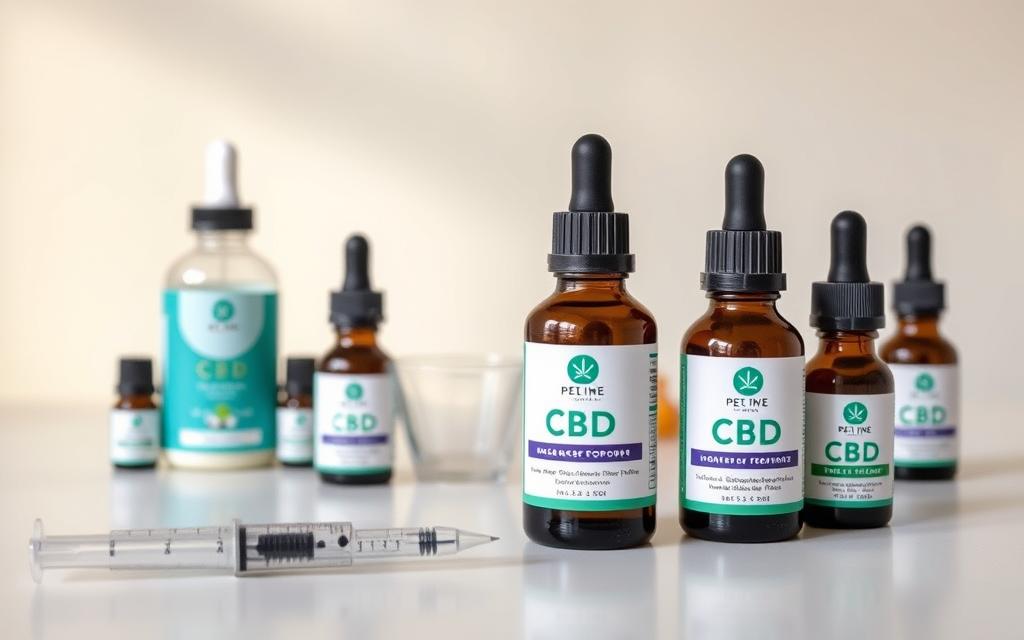
Determining the Right Dosage Based on Size and Breed
The appropriate amount of hemp-derived products depends on the pet’s weight and breed. For example, Honest Paws recommends 1-2mg per 10 pounds of body weight. Giant breeds may require up to 30-45mg daily, while smaller pets need significantly less.
Starting with a low dose, such as 0.25mg/kg twice daily, allows for safe titration. Monitoring your pet’s response over 4-6 weeks helps adjust the dosage as needed. Journaling symptom changes can provide valuable insights into effectiveness.
Best Practices for Introducing Hemp-Derived Products to Your Pet’s Routine
Bioavailability varies between oils and treats, so choose the form that suits your pet’s preferences. Oils are absorbed faster, while treats offer convenience. Administering with food can enhance absorption, but fasting may be necessary for certain conditions.
Step-by-step dropper training ensures your pet becomes comfortable with the process. Contraindications, such as pregnancy, liver disease, or use in puppies, should be considered. Honest Paws’ 60-day satisfaction guarantee provides added confidence in your choice.
Choosing High-Quality CBD Products for Your Dog
Selecting the right hemp-derived product for your furry companion can make a significant difference in their well-being. With so many options available, it’s essential to understand what makes a product safe and effective. High-quality cbd products are organic, third-party tested, and THC-free, ensuring they meet rigorous standards.
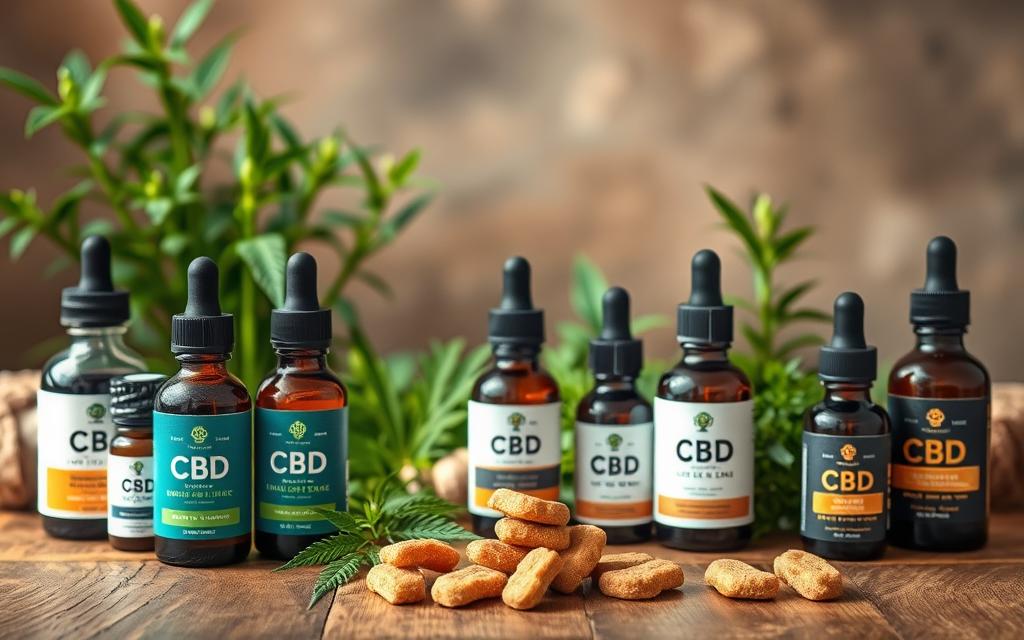
What to Look for in a CBD Oil: Organic, Third-Party Tested, and THC-Free
When choosing a hemp-derived product, prioritize organic options. These are free from pesticides and harmful chemicals, making them safer for your pet. Look for certifications like USDA Organic or NSF International, which guarantee contaminant-free products.
Third-party testing is another critical factor. A Certificate of Analysis (COA) should verify potency, residual solvents, and mycotoxins. Brands like Honest Paws and Charlotte’s Web provide batch-specific testing results, ensuring transparency and quality.
Ensure the product is THC-free or contains less than 0.3% THC. This ensures it’s safe and legal for your pet. Avoid products with vague sourcing or incomplete labeling, as these may pose risks.
“Always choose products with clear labeling and third-party testing to ensure safety and efficacy.”
Liquid vs. Treats: Which Form Is Best for Your Dog?
Deciding between liquid and treats depends on your pet’s preferences and needs. Liquids, such as oils, offer faster absorption and dosing flexibility. They’re ideal for pets with specific health concerns or those who need precise dosing.
Treats, like Pet Releaf Edibites, provide convenience and pre-measured doses. They’re also more palatable for picky eaters. However, they may take longer to take effect compared to liquids.
| Form | Pros | Cons |
|---|---|---|
| Liquid | Faster absorption, dosing flexibility | May require dropper training |
| Treats | Convenient, pre-measured doses | Slower absorption |
Consider your pet’s lifestyle and health needs when choosing between these forms. Both options can be effective when sourced from reputable brands and used correctly.
Conclusion
Understanding the potential of hemp-derived products for pets requires careful consideration of research and veterinary guidance. While studies like the 2024 CSU epilepsy trial show promise, more validation is needed to confirm long-term safety and efficacy. The AVMA emphasizes that these products should only be used under professional supervision.
Key factors to consider include your pet’s medical history and the quality of the product. High-quality, third-party tested options are essential to ensure safety. It’s also important to view these products as an adjunct therapy, not a replacement for traditional treatments.
As interest grows, some insurance providers are beginning to cover these treatments. Sharing your experiences with your veterinarian can help refine their use. For more information, consult trusted resources like the PetMD guide or the Cannabis Oil Hemp resource.
Finally, remember that while state laws may allow use, these products remain illegal in USDA competitions. Always prioritize your pet’s health and consult a professional before starting any new regimen.
FAQ
What is CBD oil and how does it work for dogs?
CBD oil is derived from the hemp plant and contains cannabidiol, a compound that interacts with the endocannabinoid system in dogs. This system helps regulate functions like pain, inflammation, and anxiety, potentially providing relief for various health issues.
Is CBD oil safe for dogs with pain?
Research from institutions like Cornell University and Colorado State University suggests that CBD may help manage pain in dogs, particularly for conditions like arthritis. However, it’s essential to consult a veterinarian before use to ensure safety and proper dosage.
What are the potential benefits of CBD for dogs?
CBD may offer anti-inflammatory effects, reduce anxiety, and alleviate joint pain. Studies have shown it can be beneficial for managing seizures and improving overall quality of life in pets.
Are there any side effects of giving CBD to dogs?
Common side effects include dry mouth, drowsiness, and mild digestive issues. Long-term safety and potential interactions with medications should be discussed with a veterinarian.
How do I choose the right CBD product for my dog?
Look for organic, third-party tested, and THC-free products. Liquid oils and treats are popular options, but the best form depends on your pet’s preferences and needs.
How much CBD should I give my dog?
Dosage depends on factors like size, breed, and the specific condition being treated. Start with a low dose and gradually increase while monitoring your pet’s response. Always follow your veterinarian’s guidance.
Can CBD interact with my dog’s medications?
Yes, CBD may interact with certain medications. It’s crucial to consult a veterinarian to avoid potential complications and ensure safe use alongside other treatments.
